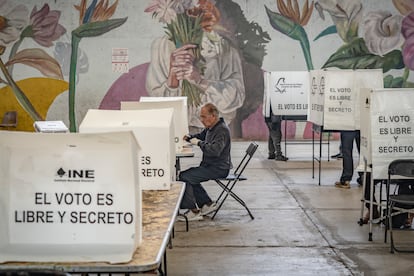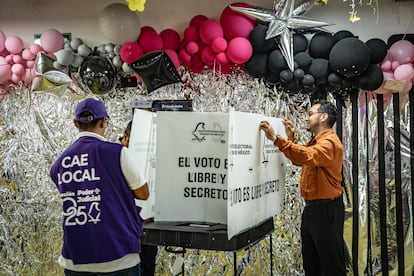Mexico’s first judicial elections draw only 13% of eligible voters
Sheinbaum calls the election day a ‘success’ despite the low turnout at the polls to select over 2,600 positions


The first judicial elections in Mexico’s history have resulted in a turnout of around 13%, well below what the latest polls had predicted. The low presence of citizens at the polling stations throughout the day foreshadowed such an outcome, further calling into question the electoral reform that led to this election.
The thousands of candidates running to fill 2,681 positions were complete unknowns to the vast majority of voters, and the complexity of having to fill out more than six different ballots discouraged participation — even more so given that people couldn’t simply vote for a party without considering individual names. The final results will take nearly two weeks to be announced.
Mexican President Claudia Sheinbaum, who just a year ago achieved a sweeping victory, has called the election a “success” and celebrated the fact that 13 million voters took part. As in previous days, she emphasized that if the government had wanted to appoint judges of its choosing, it wouldn’t have allowed the people to decide. In a video released shortly after the turnout figures were made public — around midnight — she also criticized the judiciary, accusing it of having “favored organized crime” and of committing “economic crimes.” Today, however, she said: “Mexico is the most democratic country in the world.” In recent days, Sheinbaum had said that even a 5% turnout would be acceptable — so a double-digit figure is being hailed as a win.
One of the standout images from election day was that of former president Andrés Manuel López Obrador, who came out to vote amid the curiosity of journalists and citizens in Chiapas. It was a notable moment — he has stayed out of public life since handing over power to his successor on October 1, keeping away from the spotlight and the cameras, retired at his home in Palenque, where he has been focused on writing. Since then, there had been no images or statements from him until Sunday: “We have the best president in the world,” he said as he arrived at his polling station. He added that he is in good health and expressed his happiness at having the right to elect judges, magistrates, and justices for the first time: “It gives me great joy to live in a free and democratic country.”
López Obrador laid the groundwork for the judicial reform that Sheinbaum has had to implement, after it was quickly passed by Congress. The comparison between the two presidents will be closely analyzed in terms of their ability to mobilize the electorate. Despite her enormous popularity and having won the presidency with more votes and a higher percentage than any previous president, Sheinbaum was unable to rally the public this time. In contrast, López Obrador managed a 17% turnout when he submitted himself, mid-term, to an equally unprecedented vote to determine whether he should remain in office. That was the now-famous and controversial Recall Referendum, which is now enshrined in law and one that his successor will also have to undergo.
The rush to carry out this election didn’t help either. Citizens had little time to prepare their vote amid a tangled selection process involving thousands of candidates. The system is unprecedented — only a handful of countries elect judges by popular vote, and none do so at all levels of the judiciary, as is the case in Mexico. The initiative had little political consensus. The ruling party, Morena, and its allies were virtually the only political parties that supported the judicial reform. That’s why many supporters of opposition parties followed the call to abstain from voting.
The popular election of judges, magistrates, and Supreme Court justices is the most controversial aspect of the judicial reform and is likely the domestic issue that has caused President Sheinbaum the most headaches in her eight months in office. The ruling party holds a massive majority, and the bond between the president and the public is far from fading — but the low turnout has spoiled Morena’s celebration.
The historic election has now taken place, but what remains to be seen is how capable these new judges will be in addressing the major flaws plaguing Mexico’s courts — which are riddled with corruption, classism, and political collusion. The winners of the Supreme Court race will soon be announced — a body heavily criticized by Morena leaders, and the only one where a few candidates with some degree of public recognition were running. Some of the candidates were already serving as justices on the top court, and their names were fairly well known, especially among voters in the capital. It’s possible they will be re-appointed — this time through popular vote.

The low turnout at the polls was also influenced by opposition parties, which called for a boycott of the process they had consistently opposed. They denounced the elections as partisan and warned the ruling party not to give in to the temptation of manipulating turnout figures. As soon as the polls closed at 6 p.m., leaders of the conservative National Action Party (PAN) declared that turnout wouldn’t even come close to 10% and dismissed any claims to the contrary as “fairy tales.” Ironically, with such low participation, the opposition parties might have had a real chance to get a minister of their choosing onto the Supreme Court. But instead, they chose to disregard the election entirely.
The process may be politically delegitimized, but the new judges have been elected nonetheless, as even the PAN acknowledged. The party’s national leader, Jorge Romero, granted them all the benefit of the doubt and warned that from now on, they will have to prove through their actions whether they stand for objectivity and justice — or merely serve those in power.
The election on Sunday was free, secret, and slow — more like an exam: people brought cheat sheets with the names and numbers of each candidate and sat at the polling stations to write for a while, about 10 minutes. The counting will also take its time. On Sunday, the judicial elections were on the same days as municipal elections in the states of Durango and Veracruz, but in 2027, the second phase of the judicial elections will coincide with the midterm elections nationwide, making the process even more complex.

Each and every candidate was subject to prior dismissal if they were already serving and had to run for the position again. Except for the Supreme Court, the candidates have largely gone unnoticed because the campaigns were legally very limited: everyone had to seek votes through very simple events funded with their own money. Hence, the controversy over the printed or digital ballots filled out with candidates’ names and distributed to guide voters — a practice that has been heavily criticized and will also need to be addressed by the electoral authority.
The initial screening of candidates, which was handled by the executive and legislative branches (with the judicial branch ultimately stepping aside from the process), was plagued by errors and failures that allowed inexperienced candidates — and in some cases, individuals linked to drug trafficking or with a corrupt past in their judicial roles — to slip through. The electoral authority will also have to rule on these challenges after the fact, as there was no time to address them before the elections when the ballots had already been printed.
There were no surprises in some states during election day because only one candidate was approved for each available position, rendering the election process meaningless. The result was effectively predetermined, known well before the polls opened and the votes were counted. This situation has been strongly criticized as a case of collusion, ensuring that the selected individual assumed the post without facing any competition.
These elections were promoted by the ruling party as the most democratic method of selection and as a remedy for the judicial corruption that plagues Mexico, where impunity for crimes exceeds 90%, and thousands of innocent people remain imprisoned or await trial and sentencing. However, it is difficult to convince Mexicans that simply voting will put an end to corruption, as they have ample evidence in the political arena to believe otherwise.
The recent revelations of some candidates linked to crime or unsavory practices have deepened public distrust. Criticism has intensified against the ruling party, as it was the Morena-majority legislators who screened the candidates — raising suspicions that many of them will be compliant with the party’s directives. Some analysts have warned that this could backfire on the party when a judge issues a questionable ruling, because complaints will no longer be directed at the judiciary as a whole, as has been the case until now, but rather at those who designed the process.
Sign up for our weekly newsletter to get more English-language news coverage from EL PAÍS USA Edition
Tu suscripción se está usando en otro dispositivo
¿Quieres añadir otro usuario a tu suscripción?
Si continúas leyendo en este dispositivo, no se podrá leer en el otro.
FlechaTu suscripción se está usando en otro dispositivo y solo puedes acceder a EL PAÍS desde un dispositivo a la vez.
Si quieres compartir tu cuenta, cambia tu suscripción a la modalidad Premium, así podrás añadir otro usuario. Cada uno accederá con su propia cuenta de email, lo que os permitirá personalizar vuestra experiencia en EL PAÍS.
¿Tienes una suscripción de empresa? Accede aquí para contratar más cuentas.
En el caso de no saber quién está usando tu cuenta, te recomendamos cambiar tu contraseña aquí.
Si decides continuar compartiendo tu cuenta, este mensaje se mostrará en tu dispositivo y en el de la otra persona que está usando tu cuenta de forma indefinida, afectando a tu experiencia de lectura. Puedes consultar aquí los términos y condiciones de la suscripción digital.








































